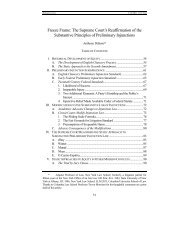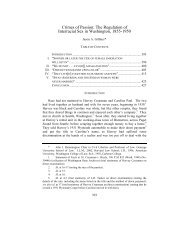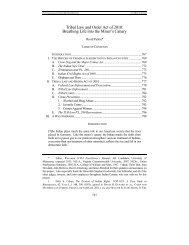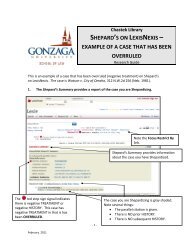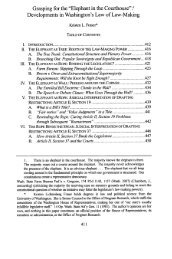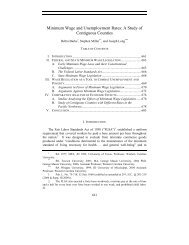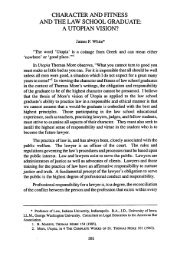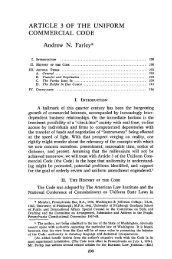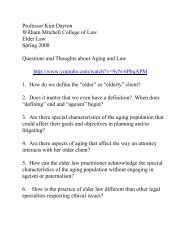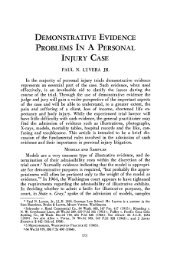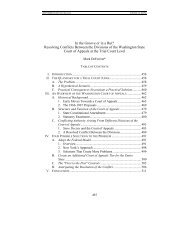professional responsibility, student practice, and the clinical
professional responsibility, student practice, and the clinical
professional responsibility, student practice, and the clinical
You also want an ePaper? Increase the reach of your titles
YUMPU automatically turns print PDFs into web optimized ePapers that Google loves.
1990/91]<br />
STUDENT PRACTICE<br />
o<strong>the</strong>rs, <strong>the</strong>re should be less reluctance to take over primary <strong>responsibility</strong> for<br />
<strong>the</strong> relevant task. For example, in supervision of a <strong>student</strong>-conducted<br />
deposition, intervention may not be necessary to prevent irreparable harm to<br />
<strong>the</strong> client's cause. But it may be desirable <strong>and</strong> appropriate to avoid <strong>the</strong><br />
necessity of having to reconvene <strong>the</strong> deposition at a later time to ferret out<br />
information which <strong>the</strong> <strong>student</strong> missed.<br />
It may be argued that <strong>the</strong> <strong>clinical</strong> teacher will always be in a superior<br />
position to expedite litigation <strong>and</strong> minimize emotional <strong>and</strong> financial costs to<br />
<strong>the</strong> client <strong>and</strong> o<strong>the</strong>rs. The discussion concerning o<strong>the</strong>r intervention<br />
considerations indicates this is not <strong>the</strong> case. In any event, this criterion for<br />
intervention will necessarily have to be weighed <strong>and</strong> balanced against those<br />
o<strong>the</strong>r considerations.<br />
The five listed considerations are by no means exclusive. They do,<br />
however, encompass values at <strong>the</strong> core of <strong>the</strong> <strong>clinical</strong> teacher's <strong>professional</strong><br />
<strong>responsibility</strong> to clients. These can be summarized as follows:<br />
1) Respect for <strong>the</strong> client's <strong>professional</strong> relationship with <strong>the</strong> <strong>student</strong> <strong>and</strong><br />
expectations flowing from that relationship;<br />
2) Respect for <strong>the</strong> client's right to make an informed decision about<br />
<strong>student</strong> representation <strong>and</strong> its. advantages or disadvantages;<br />
3) Concern for <strong>the</strong> client reflected by <strong>the</strong> <strong>clinical</strong> teacher's ability to<br />
adequately diagnose <strong>and</strong> predict <strong>student</strong> competencies;<br />
4) Concern for <strong>the</strong> client reflected by <strong>the</strong> <strong>clinical</strong> teacher's personal<br />
readiness <strong>and</strong> competence to assume client representation<br />
responsibilities; <strong>and</strong><br />
5) Concern for adverse collateral consequences to <strong>the</strong> client <strong>and</strong> o<strong>the</strong>rs<br />
which might be avoided through intervention.<br />
III. CORE VALUE CRITERIA IN OPERATION<br />
I recently supervised a third year law <strong>student</strong> who conducted <strong>the</strong> defense<br />
of a young man charged with <strong>the</strong> crime of reckless driving. Conviction of this<br />
charge in Washington subjects a defendant to a m<strong>and</strong>atory loss of license, a<br />
fine, <strong>and</strong> possible time in jail. 68 The client elected a jury trial because of his<br />
belief that a judge would be more prone to credit <strong>the</strong> testimony of <strong>the</strong> police<br />
68. WASH. REv. CODE § 46.61.500 (1991).



